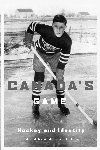
Canada’s Game: Hockey And Identity
Edited By Andrew C. Holman
McGill-Queen's University Press
$24.95
paper
248pp
978-0-7735-3598-5
There’s also no answer to another problematic term, “Canadian identity,” because the book focuses on how our identity continues to be proposed through hockey. In some ways this proves a narrow field, particularly in the section on sports fiction. It may be that the areas under discussion have only begun to be explored. Too late, in some cases: Russell Field’s piece on early NHL fans is primarily a confession of what can no longer be known.
Just one essay deals with Quebec, but it more than carries its weight in provocation. Robert Dennis covers the Montreal Forum’s closing ceremonies, when the Canadiens were moving to the (then) Molson Centre. It was 1996, the year after the last sovereignty referendum; the times’ flavour is evoked by a film, Le Fantôme du Forum, produced by the PQ-led government for the occasion. It’s enough to say that it involves a culturally-insensitive Anglophone boss, and his Francophone employee: the latter has to beg for time off to see Maurice Richard score number 500 at the arena, and dies trying.
While the PQ obviously grasped the Forum’s part in the Canadiens’ cachet, Dennis indicates his reluctance to do so by trying to associate the building’s importance with the religious and political rallies held there. He’s far more confident about the Molsons, who were putting their own spin on the Forum legend. In Dennis’s view, they “usurped” a “public urban space” for commercial interests. Molson’s directors will be wondering what they paid for when they bought the Forum, and why the author lets the PQ off so easily. But Dennis is right, in a sense: a “usurped” Forum explains popular feelings about its post-Canadiens fate.
The theme of “usurping for commercial interest” points to this book’s third problematic term: hockey. To most Canadians it’s synonymous with the NHL, but that wasn’t always so. Several essays cover the development of the professional league as part of the emerging North American entertainment industry, turning boys who once played on a village team into big city stars, more often than not across the border. The nearest thing to a recurring theme in Canada’s Game, and the one that may finally define us as Canadians, is anti-Americanism. As Brian Kennedy notes, even the 1972 Canada-USSR series had its blame-the-Yanks side. But Craig Hyatt’s and Julie Stevens’ essay “Are Americans Really Hockey’s Villains?” points out that the men who made the professional game what it is were Canadians, from ex-McGill defenseman James Norris to those Winnipeg businessmen who let the Jets go to Phoenix.
The NHL business is thoroughly explored in Julian Ammirante’s study of the 2004 lockout. Ammirante is stronger on the game’s economics than on the number of Stanley Cups Gretzky won, but he does make a statement that should grab the thinking fan’s attention: hockey as a commodity, and the wish for a repatriated sport, don’t equate. Still, he doesn’t explain why Canadians think they need a Hamilton franchise.
The only contributors to Canada’s Game who research what fans are thinking – and almost the only ones who rely on unpublished material – are Hyatt and Stevens, whose discipline is sports management. This suggests that more primary research might help the other, more traditional academic disciplines represented to grasp hockey less partially. Canada’s Game makes a good set of starting points. mRb






0 Comments